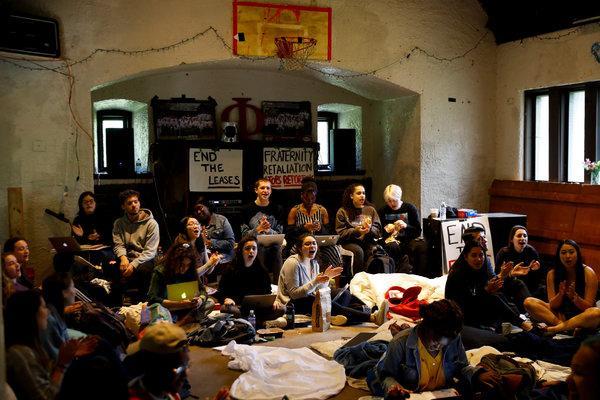Swarthmore College’s newspaper, “The Phoenix,” published an article on April 18 exposing one of its college fraternities, Phi Psi, for its horrific practices of hazing and sexual misconduct. Among these practices, the fraternity infamously named a section of their house the “rape attic,” within which brothers allegedly sexually harassed young women.
In response to the exposé, many Swarthmore students flooded the frat house and refused to leave until the college disbanded both of its fraternities, Phi Psi and Delta Upsilon. Swarthmore College students had been aware of the fraternities’ actions for years but their complaints to the administration were met by deaf ears. One student, for instance, had spoken not only to the fraternity liaison about the fraternity’s actions but also to the dean of conduct, the dean of students and the president of the college. The student was unsuccessful. As a banner the student protestors put on the front of the frat house read, “ADMIN KNEW ALL ALONG.”
Talking was unsuccessful. Reclaiming the space in the fraternity house and declaring that the possession of this space would no longer mean the perpetuation of rape culture, however, worked. By the end of the four-day sit-in, both Delta Upsilon and Phi Psi had released statements saying they had disbanded. Now, the Swarthmore student protestors are fighting to ensure that their administration makes it so these institutions can’t come back and to find ways to re-imagine how these on-campus spaces might be used by the whole community.
We at The Wellesley News stand in solidarity with the Swarthmore students who have been working to rid their college of both the presence and ramifications of Greek life. We also condemn the Swarthmore administration for ignoring the voices of students, both past and present. How are students expected to speak out about injustice when their cries are so often silenced by the powerful, reluctant to break with a tradition rooted in the oppression and violence of outsiders?
We also recognize that at Wellesley students, we need to reevaluate our own relationship with Greek life. At Swarthmore, the reason the fraternities lasted so long was because, quite simply, they were the only place on campus where students could reliably drink, dance and party. Years ago, Swarthmore —in a misguided attempt to make students safer — cracked down on all large-scale parties on university property. This left the frats in complete control of the only party culture Swarthmore had left: through a generations-strong alumni network full of wealth, they were able to finance their own parties, which occurred with considerably less administrative scrutiny. Rather than making students safer, the rules made sure that Swarthmore’s students — and here we think primarily of the women that have been targeted and abused across generations — had to play by the fraternities’ patriarchal, objectifying rules.
At Wellesley, we see ourselves in a similar situation. Campus police are called on small dorm parties and patrol the few large-scale events the College enjoys. With no outlet for fun away from the watchful eye of the cops on campus, many students — in particular first-years, the most vulnerable among us — turn to MIT and Harvard fraternities and final clubs for their fun. We aren’t fools: we know full well when we are putting ourselves in dangerous situations. Many of us have read the statistics saying that men in fraternities are much more likely to commit acts of sexual harassment and assault than men outside of frats. We know that, when we enter a space where we’re judged on how hot we are, we are offering ourselves up to be objectified.
But the thing is, college students like to party. And because we have so few avenues to do so here on our own campus, can anyone blame us for seeing this out elsewhere? The situation at Swarthmore shows us that, to get out from under the control fraternities exert on too many of our social lives, we must radically re-imagine what fun looks like outside of spaces that perpetuate rape culture. And Wellesley must allow us those spaces, rather than pushing us outside of our community to places where we will be far less safe.





